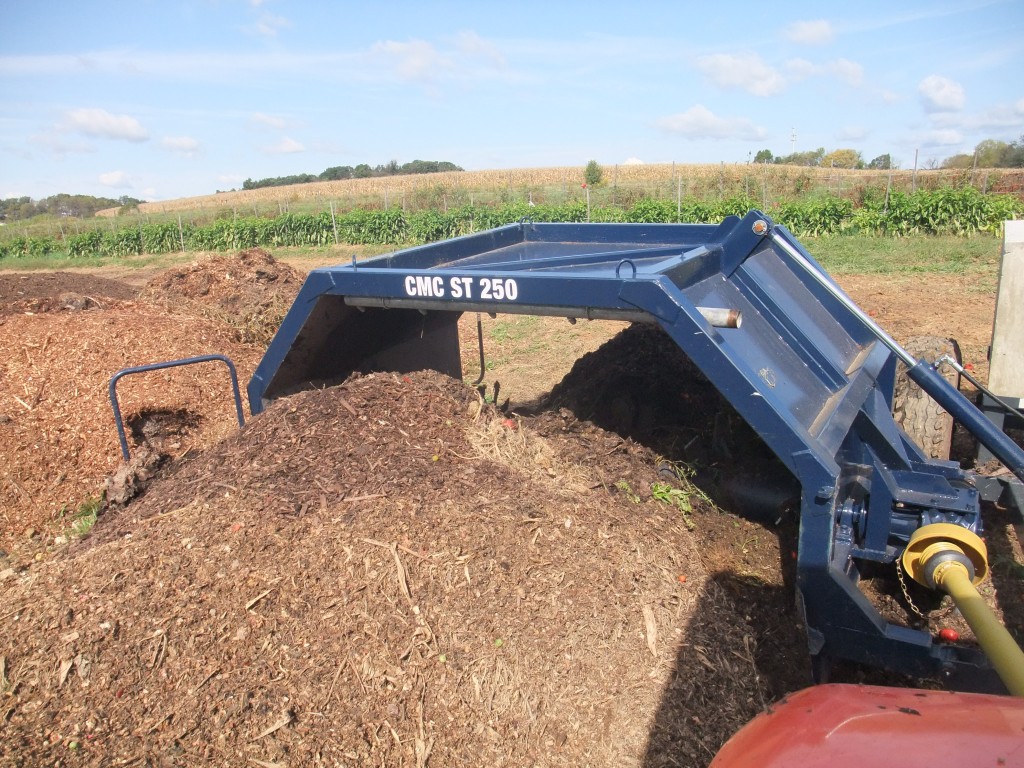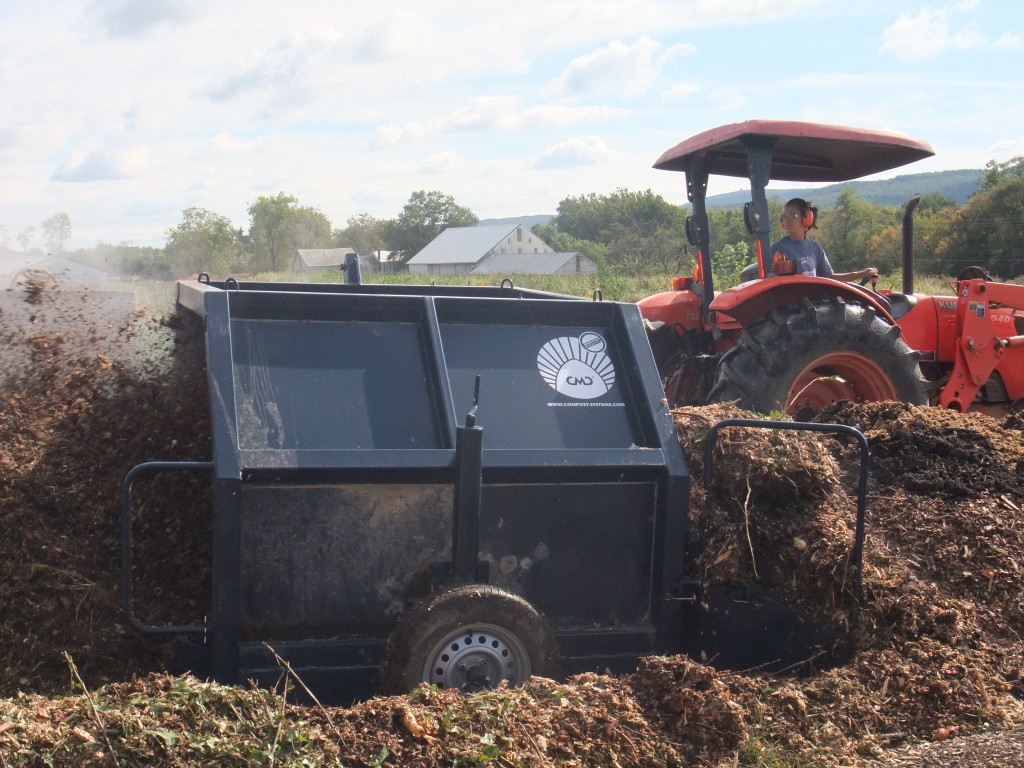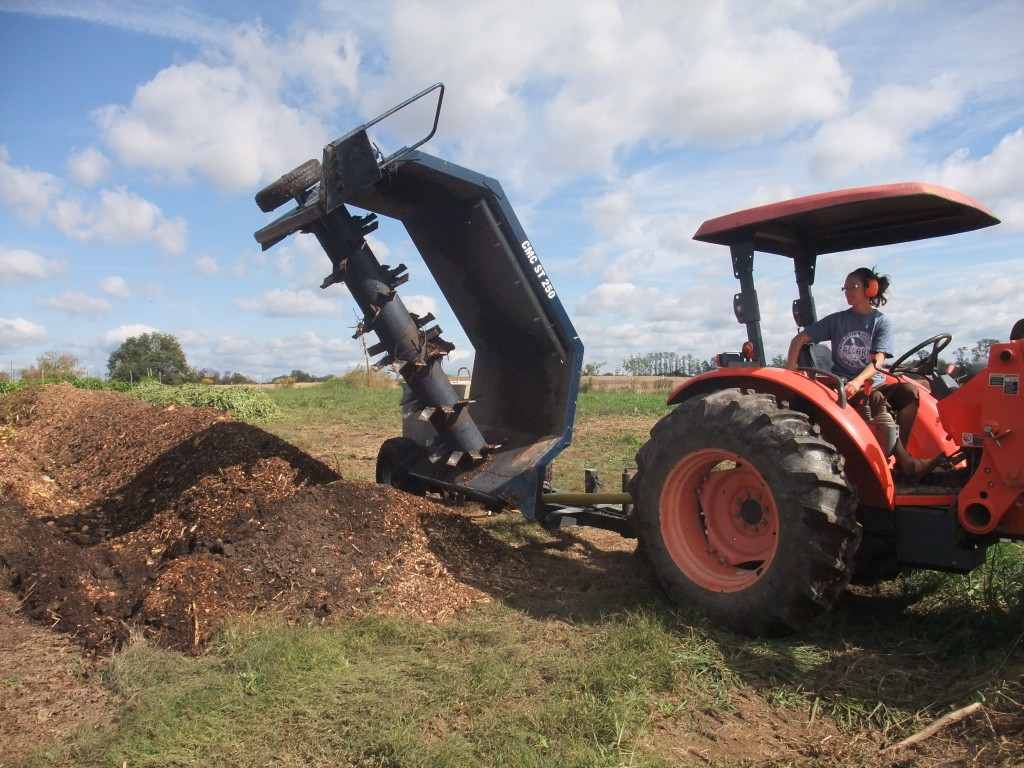Compost

Compost is a nutrient-rich, biologically active soil amendment made from decomposed organic wastes. The composting process starts when biodegradable materials are combined in a proper mixture and level of moisture. Bacteria, fungi, and other creatures break down compost feedstocks into a stable soil-like humus that is rich in nutrients and beneficial microbes.
Compost Overview at the College Farm
Student Farmers pick up food waste from the Dickinson College Dining Hall every day, 7 days a week, and transport it to the Dickinson College Farm. Starting in 2002, students began collecting approximately 50 lbs of salad waste per day from the dining hall, which was used at the then Student Garden, a ¾ acre “mini” farm located near D-Park off campus. When the Student Garden expanded into the College Farm program in 2007, all of the food waste produced at the Dickinson College Dining Hall along with campus residence halls was transported to the College Farm, located 7 miles from campus. Student Farmers collect approximately 800-900 lbs. of pulped food waste per day. Dining Services places the waste in green 7-gallon bins that are loaded into the farm’s trusty “compost truck” for transport to the Farm. Until 2024, the food waste was emptied into the bucket of the farm’s tractor, mixed with leaves, mulch hay, or wood chips, and added to one of our windrow compost piles. Once sufficient in size, windrows are turned to initiate aeration and ignite the decomposition process. Our compost piles may be turned 2-3 times or more over the course of a growing season before the organic materials (food waste, leaves, wood chips) have broken down sufficiently and become ready to use. From 2007 until 2012, turning was done with a tractor bucket loader, or with pitchforks when the farm was starting out as the student garden. As you can imagine, this LOT of work. However, in 2012 we purchased a mechanical compost turner that allows us to turn the piles more efficiently, resulting in a faster composting process and higher quality finished product. Completing the circle, the compost is used in the cultivation of vegetables that are sent back to the dining hall for students, faculty and staff to eat!
Over the years, the College Farm has engaged community partners in food waste recycling via composting. Partners like Project SHARE, our local food bank, brings truckloads of food waste on a regular basis. This helps them manage their dumpster fees by diverting biodegradable waste from going to the landfill. Additionally, the College Farm works with local schools, breweries and restaurants to pick up brewing wastes and kitchen scraps. In 2022, student Claire Hallman (’23) and the College Farm partnered with our local farmers’ market, Farmers on the Square to create the opportunity for market goers to bring food waste to market each week. Collected food waste is added to the farm’s windrows.
More recently, the College Farm is re-envisioning how best to divert food waste from our campus and local community and recycle it into compost and energy. In 2024, the College Farm launched its waste-to-energy biogas project (click here for details). As a result of this great initiative, the College Farm is collaborating with more food waste generators like bakeries, more restaurants, and even local hospitals to “feed” our biodigester. This project is so important as a model for small-scale farms like those across Pennsylvania that Governor Shapiro came to visit! As you will read and watch on biogas, in addition to converting waste to energy, a by-product of anaerobic digestion is nutrient-rich effluent. This liquid is teeming with all of the essential ingredients needed to make high quality compost. Moving forward, College Farm compost will integrate effluent with collected wood chips and leaves from the community to make high quality compost.
The College Farm staff is so dedicated to making compost that it wants to supply the local community with this amazing resource. To learn more about how to access our farm-made compost, please visit our Compost Square website and share this QR code!

____________________________________________________________________________________________________________________________________
Composting Program Milestones
In 2007, the Dickinson College Farm was awarded a Department of Environmental Protection Composting Infrastructure Development Grant. This $93,000 award enabled the College Farm and campus Dining Hall to significantly increase their efficiency with the collection and composting of food waste, allowing us to handle approximately 91,000 additional pounds of material annually.
We used the grant to purchase of a commercial food grade pulper, the Hobart WastePro Pulper, which allows for 100% composting of pre- and post-consumed food waste. The pulper compacts solid waste into a semi-dry pulp, reducing waste volume by up to 88 percent. As a direct result of the composting program, sink garbage disposals have been eliminated across the entire dining services operation, lowering the college’s water and energy consumption.

Check out a YouTube Video about our compost program from 2009-2012, created by Emily Bowie ’14!
Below: Our Autrusa Compost Turner, Circa 2012
2024: The anaerobic digester comes to life! Our waste-to-energy biogas project went live in August 2024. See our students loading food waste into the system in this video!
_____________________________________________________________________________________________________________________________________




